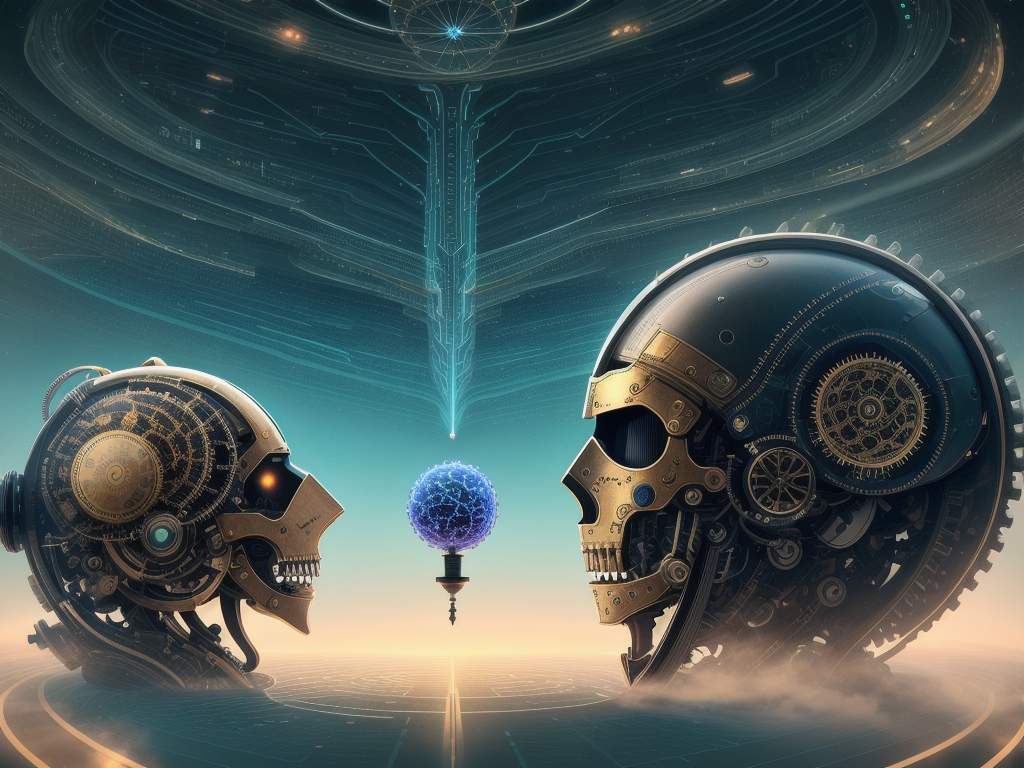The New Bicameral Minds

Every morning, I get up early and start getting lunches ready for the kids, prep the table for breakfast, sweep around said table, fill water bottles, and so on. This is my Monday to Friday routine, at least until school gets out in a couple of weeks. While I go through this routine, I usually have my earbuds in and I listen to the latest news, a podcast on the go, or an eBook. While I don't exactly remember what I was listening to that prompted this post, I do remember somebody talking about most people eventually having some kind of personal AI agent at the beck and call, 24 hours a day.
That idea bounced around in my head and though I don't remember the source, I do remember thinking that if we have this ever-present partner, then eventually we'll probably have it available for conversation via something like my earbuds, or maybe via an implant. Eventually, this AI companion might start to seem like another part of us, like our smartphones, only more so. Thinking about this brought back thoughts of Julian Jaynes' theory of the bicameral mind and how this personal AI might breathe new life into this idea.
In case you don't already know, Julian Jaynes was an American psychologist who was best known for his book, "The Origin of Consciousness in the Breakdown of the Bicameral Mind", published in 1976. In this book, Jaynes proposed a radical theory that human consciousness (as we generally understand it) is a learned process based on metaphorical language, and that before the development of consciousness, humans operated under a different mentality called the bicameral mind.
This bicameral mind was characterized by distinct auditory hallucinations. These weren't just muffled self-talk, but voices you actually heard, and perceived as the voices of gods, angels, ancestors, and so on. These voices would guide us humans to make decisions, build temples, go to war, or other important things. In Jayne's view, the human mind was essentially split into distinct parts, or chambers. "Bicameral" literally means "two chambers".
Jaynes supported his theory with evidence from neuroscience, psychology, archaeology, history, and ancient texts. He also suggested that the transition from the bicameral mind to consciousness occurred around the end of the second millennium BCE in Greece and Mesopotamia, and at different times in other parts of the world. Eventually, somewhere around 3000 years ago, those voices in our heads fell silent, or retreated to the persistent self-talk we all engage in (did I leave the oven on before we left?). These days, when someone talks about hearing 'voices in their heads', it's usually considered a serious cause for concern.
Warning: the music video below is disturbing, so consider yourself warned.
Jaynes’s theory has been, and continues to be, controversial but its influence is undeniable. Implications for understanding human history (why this or that person acted the way they did), culture, beliefs (religion), as well as phenomena such as schizophrenia.
Fast forward to the present day, we find ourselves on the precipice of another monumental shift in our consciousness, not driven by changes within our minds, but by changes outside, in the realm of artificial intelligence, specifically those personal AI assistant/companions I alluded to at the beginning of all this.
Our relationship with AI, particularly personal AI agents serving as companions or therapists, presents an interesting parallel to the bicameral mind. As these AI systems engage with us, providing guidance, insight, and companionship, they play the role of an external voice, prompting introspection and emotional exploration, in much the same way as the 'speaking' part of the bicameral mind once did. Our collective selves would once again inhabit two chambers.
Of course, there's a critical distinction. In the bicameral mind, the voices were perceived to be beyond questioning, attributed to divine entities. In contrast, we understand that AI's responses are based on machine learning, Internet access, and programmed algorithms, and not personal experience or consciousness. For now. Eventually, this will become completely transparent, and natural. See where I'm going with this?
There's already a precedent for the integration of external elements into our human bodies and minds, blurring the boundaries between us and our tools. From the use of glasses (I wear contacts) that augment our sight, to the experience of driving a car, where we become hyper-aware of the vehicle's sensations and movements, we frequently adapt to and incorporate technology into our perception and cognition. Anyone who drives regularly will know this feeling of being part of the car, or of the car being a part of you.
It's the kind of temporary symbiosis that transforms our interaction with external objects into a more intimate and integrated experience. Gamers understand this; you stop thinking of the controller as this thing with buttons and joysticks, but as your weapons and abilities. VR gamers (guilty as charged) start treating the controllers as if they are hands, tools, and weapons.
Similarly, our interaction with AI might evolve as they become more sophisticated, personalized, and intuitive. They could become integrated into our lives and thoughts in a manner akin to wearing glasses or driving cars. This adaptation is not simply about accepting the presence of AI, but about allowing AI to become a part of our cognitive processes and everyday lives. A part of us.
In Jayne's bicameral mind, the 'voices' were an actual consciousness (or the precursors of modern consciousness), and I won't speculate on the whole 'can an AI become sentient/sapient/conscious here. AI, for now, at least, attempts to emulate consciousness, but it does it so convincingly, that we can't overlook the potential for AI to become deeply, and intimately, integrated into our lives, influencing our decision-making processes and, dare I say it, even reshaping our emotional relationships (no more excuses for forgetting birthdays and anniversaries).
Our relationship with this kind of technology is a kind of symbiotic coevolution, a dance between our minds and the tools we create. Whether the future involves a merging of humans and AI, or a clearer delineation between the two, remains to be seen.
We moved from distinct and separate voices that 'spoke to us' to that nagging voice in some shady corner of your head that, like the one in mine that's asking if I really need that donut while reminding me of the extra time I'll need to work on the treadmill to make up for the extra calories. Just as we moved from divine voices in our heads to AI voices in our devices, we will first encounter our personal AIs as separate voices, but how long until that bicameral mind breaks down?
I'd love to hear your thoughts on this. Leave a comment to tell me you agree with me, or to tell me I'm out of my tree. Either way, please do share this with your friends, family, colleagues, and even enemies on social media. Finally, if you haven't already done so, please subscribe to my newsletter.
